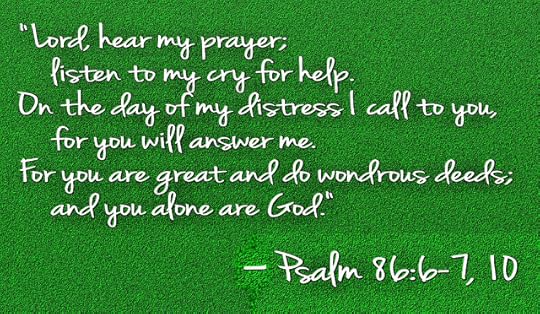John Janaro's Blog, page 101
March 16, 2021
Calling On The Spirit
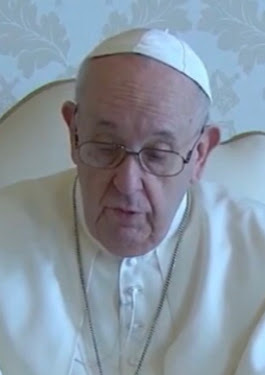 "It often happens that we don't pray, we don't feel like praying, or sometimes we pray like parrots: with the mouth, but the heart is absent.
"It often happens that we don't pray, we don't feel like praying, or sometimes we pray like parrots: with the mouth, but the heart is absent."This is the time to say to the Spirit, ‘Come, come Holy Spirit, warm my heart. Come teach me to pray, teach me to look to the Father, to look to the Son. Teach me the path of faith. Teach me to love, and above all teach me to have an attitude of hope.’ It's about constantly calling on the Spirit to be present in our lives" (Pope Francis).
March 15, 2021
Everything is Grace? Reflections on Grace and Freedom
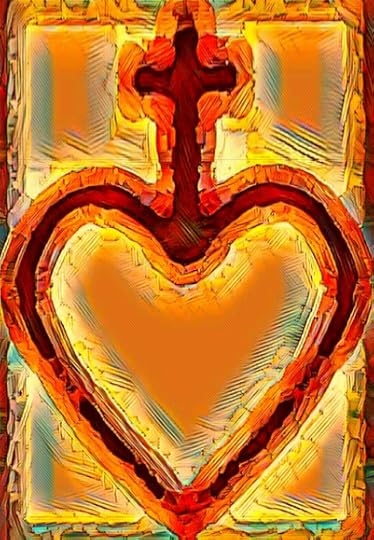 "Everything is grace," Saint Therese famously said. Indeed, that is the Gospel of redemption in Jesus Christ.
"Everything is grace," Saint Therese famously said. Indeed, that is the Gospel of redemption in Jesus Christ.This doesn't mean we don't "have to do anything" in our relationship with God. We respond, act, and even "merit" the fruit of our actions, but all of this (and much more) is the gift of grace through Jesus Christ. God inspires, sustains, and brings to fulfillment every act that we perform that takes us forward along the path of salvation.
God is the source of all that is good. He gives us our good actions, but in such a way that they are really our own. We are not puppets. We are free human persons who freely love God because He empowers us to love Him and "moves us" in the very depths of our freedom. The Holy Spirit anticipates, awakens, inspires, enlightens, draws, heals, elevates, sustains us totally. He precedes us, touches our hearts, mysteriously works within our humanity, calls us and begins to change us, "sowing the seeds" and "cultivating the field" of our hearts, and He does this in the lives of all human beings, including the billions of people who do not (yet) "know" Jesus explicitly. God's goodness is always "at work" - He draws us according to His mysterious plan of wisdom and love, and then inspires us to "cooperate" with His work, so that the infinite victory of Jesus on the Cross and in the Resurrection might fill and transform our lives, and be the vital center of the whole world and all of history.
There is much that is mysterious in this plan of God for every human person in Jesus Christ. Jesus is, after all, the Mystery drawn close to our lives, the Mystery made flesh, dwelling among us. The grace of Christ is superabundant, and the wide world and its many peoples strike us with awe and wonder at the unfathomable ways Our Lord works in every human heart through the inexhaustible love of His Most Sacred Heart.
If we really love Him, we want to share in His work. We want to witness to Jesus Christ, with humility, with reverence for every person, for peoples and cultures, for all that is holy and good in all the religious traditions, and for the many efforts throughout history to articulate the cry of the human religious sense (already stirred up, drawn, and helped in countless ways by God's grace). It is love that moves us to cry out (with our voices, with our lives) that Jesus is the gift of God, the source of all grace, the embrace of God who opens His arms to each one and to every one, who makes all things possible.
We who are Catholic Christians ought to meditate on the mystery of God's gratuitousness, which is beyond all measure. We must not shy away from the awesome mystery of God's grace.
I would like to propose a few considerations:
Everything really is grace. God accomplishes our salvation and sanctification in us and with us. He raises us up through Jesus Christ in the Holy Spirit according to His gratuitous love, freely adopting us as His children and giving us a participation in His own life. He calls the human persons He has created to a life that eminently fulfills and validates all our fundamental desires for truth and goodness, even as it draws us "beyond" this world to a new creation that "eye has not seen, nor ear heard," in which God will "be all, in all."
He forms our very identity as persons in light of this destiny, for we are not merely hypothetical realizations of some abstract concept of "human nature." We are members of the human family who enter into the concrete reality of human history that unfolds according to God's wisdom. This entails the tragic mystery of our own indigence, our disoriented humanity, but God is here for us with His ever-greater love, giving Himself to us in the incarnate, crucified, and risen Jesus. And through Jesus in the Spirit, He gives us new life - He prompts, initiates, empowers, and sustains our loving response to Him.
Everything is grace. Even our response to grace is the work of grace giving us supernatural freedom and its acts in such a way that they are truly our own, so that we really participate in God's love and become like Him and totally abandoned to Him even as we become most fully "ourselves"!
Everything is grace. This is a mystery which we cannot understand, but which we can contemplate in such a way that our confidence in God's love for us grows even as we attend to the responsibilities He entrusts to us in this life.
It sometimes appears, however, that we forget the full measure of what God's grace means, and we live according to a reduced conception of the depths of God's love for us and the dignity of our vocation.
We Catholic Christians can give the impression (and sometimes we even think, in the practical order of things) that grace is a sort of deal where God does half of it (or even most of it) but we have to "come up with something in addition" to what He does - we have make some radical contribution (however small) from ourselves alone, from our own power that we possess "autonomously." In the drama of salvation (as well as "good works"), we can be tempted to think that there is something we do "without God," something that fundamentally originates from us and us alone. If we "do our part," then God's power can and will "help" us.
This way of speaking, especially in the form of exhortation, is not uncommon in pastoral theology and homiletics. It aims to address the freedom of the will in its practical dynamics, the psychological reality of how this mysterious thing called freedom - my freedom - engages, chooses, and carries out actions that are truly my own actions.
The Catholic understanding of freedom, however, is embedded within the context of the whole mystery of salvation as conveyed by the complete, integrated witness of Sacred Scripture to the love of God, the human beings He has created, and the person and redeeming work of Jesus Christ - the witness that has been handed down from the Apostles, and that continues to be preached and given and lived in the Christian community today.
It takes a lot of theology to unfold what this means for human freedom. Suffice it to say that omnipotence does not cancel out human freedom, or render it "less free" or less "my own." On the contrary, Divine omnipotence is what makes human freedom possible, what makes my freedom possible, and what makes it possible for my actions to be truly "my own" - it is what makes the very reality of "me" in such a way that I am truly "myself." Clearly, much more needs to be said, and we learn a great deal from theology. But at the end we still find ourselves intellectually in the presence of a luminous paradox, which we recognize as the mystery and the ineffable splendor of superabundant Love only by means of a living, trusting, ecclesial faith.
As Catholic Christians in today's world, however, we can very easily become removed from effective contact with the environment generated by the witness to salvation, the reality of Jesus Christ living in His members through history and in the here-and-now (even with all the sins, mistakes, negligence, and stupidity of these members). He has promised to be with us always, and that we will always find Him here - the Crucified One, the Risen One who saves us. Here is where we are called to "live our faith." If we become distant from the "gathered people" called together by God (the ekklesia, the "church") and entrusted by God with the witness of salvation, we will be like fragments, like fishes out of water. We may identify ourselves as Catholic (even with a measure of intellectual coherence) but still be in some manner "distanced from" the life, the nourishing vitality of this "church," Christ's Church, Jesus Christ living in His Church. In this fragmented condition, our understanding and our words about our faith can subtly slip out of the context of the whole.
Not surprisingly, our mentality can thus easily reduce the mystery of grace and freedom to the idea that God does "some of it" or "most of it" but that we have to do "our part" - indeed that we have to do our part "first," fundamentally, exclusively from our own solitude, "before" God can do anything for us. We may live this mentality as an attitude toward life even if we intellectually reject what it expresses - which is in fact the heresy of "Semi-Pelagianism."
I think that this weakens the confidence, the hope, the trust of many Catholics, because they feel like they don't have that self-initiated, self-sustained "oomph" of will or energy that they think they need in order to summon from within themselves that radical "first step." In fact, they don't have the "oomph" to conjure God's love.
 The good news is that our God doesn't need to be "conjured." He is already here. He has come to be with us, to make us like Him. He is "already" loving us, and if we even begin to turn to Him it is because He has already called us. Everything is from Him.
The good news is that our God doesn't need to be "conjured." He is already here. He has come to be with us, to make us like Him. He is "already" loving us, and if we even begin to turn to Him it is because He has already called us. Everything is from Him.Everything is grace, even our (truly free, truly "our own") response to grace. God wants to give us the capacity to love Him and the realization of that capacity. He enters into every aspect of our lives by taking flesh. Jesus.
The grace and salvation of God reach our lives in and through Jesus. Whenever we speak of these things we always must look to Jesus and come back again and again to Jesus. We are adopted sons and daughters of the Father IN HIM. We depend totally on Him, Jesus Christ.
What can radically "originate" from a human person "independent" of God? Nothing. No thing.
I can't adequately explain the mystery of how we freely "cooperate" with grace. We cooperate with grace by means of grace - by the working of the creative and transforming power of the Infinite Love of God in us, empowering us and effecting our action, which is precisely what makes our cooperation really free and really our own.
I don't know how we even exist - how we have "being" in a way that is totally dependent on God and also truly "our own" - there is no adequate metaphor for the primordial mystery of a created person, much less the grace-given "meritorious" (praiseworthy) acts of an adopted child of God --well, the images in the New Testament are best.
What is maybe a bit easier to see is the one "way" that we really are radically, independently "free" - without God we can do nothing, which implies an awful possibility. What if, in the presence of God, solicited constantly through life by His Infinite love, embraced by Christ on the Cross with the redeeming and transforming power that wills to generate a new freedom within us, we do... nothing?
Freedom implies that we don't "have to" love God. We can "non-accept" all this tremendous grace and love. Let us not think that saying "God takes the initiative" means that we should just sit around and do nothing, waiting for God to "show up" in a way that impresses us. He is already here and already at work within our hearts. We have no excuse to "do nothing." Of course, no one can entirely negate themselves, which is why our "non-acceptance" of God's love in Christ leads us to the wild effort to flee from Him and plunge into the nothingness of sin.
We may try to identify ourselves with the nothingness of our non-response to God's grace, but God remains omnipotent. He can create (or recreate) "something" where before there was "nothing." He is the Lord. Nevertheless, if we really are trying to be frozen in our nothingness, being recreated as something new is going to be a momentous change. God is not a bully. Are we going to "allow Him" to change us?
We have to (inadequate words here) "let" God change us, "let" Him empower us, etc so that we live more and more in Him. This is important, because the self-shriveling unfreedom of sin ultimately brings home to us the reality of our powerlessness and we may be tempted to despair. If I feel stuck, lost, afraid, frozen, "unwilling," what can I do?
PRAY. "Lord give me the desire..." "Jesus, give me the desire for the desire..." These things are mysterious, but prayer begins because we allow ourselves to be drawn into the relationship. Jesus will give us what we ask for. The Father loves us and is always tending us for our good even long before we think of praying. Be He doesn't force us. We can "stay closed" to God's love. We can say "not" to all the ways Divine love pours out to open us up. This is the mystery of sin, of iniquity.
The negation of God's love: our desperate world seems dominated by it. Our own hearts have so much need for light to reach dark and shadowy places within them. Sin and death are a terrible weight, and a pretense of meaninglessness that brings misery and destruction. Still, God's love wins the victory through Jesus Christ. His grace is the gift of healing and redemption, salvation and transformation to eternal life.
There's so much that needs to develop from these thoughts, but there they are for now.
March 13, 2021
Grace: Our Need For His Mercy
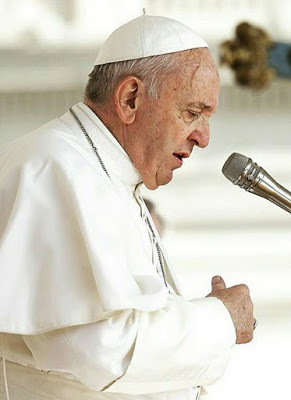 Be reconciled: the journey is not based on our own strength. No one can be reconciled to God on his or her own. Heartfelt conversion, with the deeds and practices that express it, is possible only if it begins with the primacy of God's work.
Be reconciled: the journey is not based on our own strength. No one can be reconciled to God on his or her own. Heartfelt conversion, with the deeds and practices that express it, is possible only if it begins with the primacy of God's work. What enables us to return to him is not our own ability or merit, but his offer of grace. Grace saves us; salvation is pure grace, pure gratuitousness. Jesus says this clearly in the Gospel: what makes us just is not the righteousness we show before others, but our sincere relationship with the Father.
The beginning of the return to God is the recognition of our need for him and his mercy, our need for his grace. This is the right path, the path of humility. Do I feel in need, or do I feel self-sufficient?
March 12, 2021
Happy Birthday Christina Grimmie, 2021
On March 12th - the 27th anniversary of Christina Grimmie's birth - TeamGrimmie people all over the world celebrate her legacy, play her music, and remember her bright beautiful life with gratitude and "With Love"🎶.💚
(I'm not sure how I like some of these new graphics applications, but I'm trying them out. Not everybody looks good as a "cartoon," but our girl rocks it.😉)
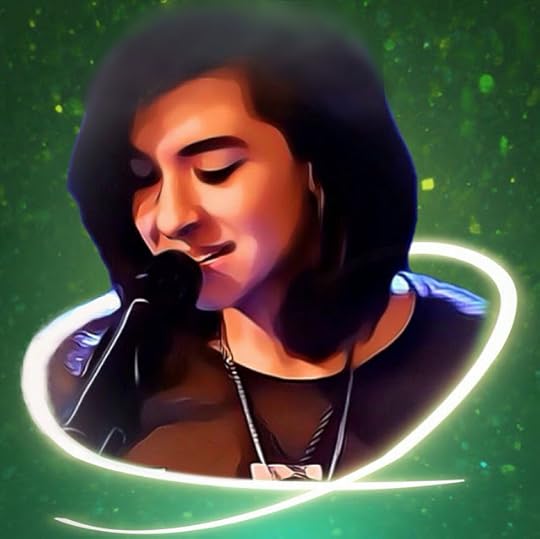
***************************************************************************************Dear, dear, great-hearted Christina: We miss you. We will always love you!
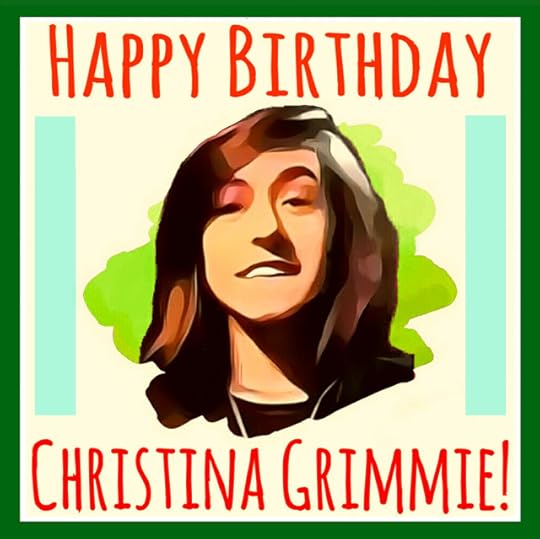
March 10, 2021
Anniversary of My Baptism
I don't often make special note of today's date, even though the most decisive event of my life took place on it. On this day, 58 years ago, Jesus Christ entered the history of my life and claimed it - specifically and precisely - for Himself.
Baptism. A moment in time wherein Jesus - God and man, incarnate, crucified, and risen - makes Himself the foundation of eternal life for a particular human person.
May the Lord bring to fulfillment what He began in me, on that day.
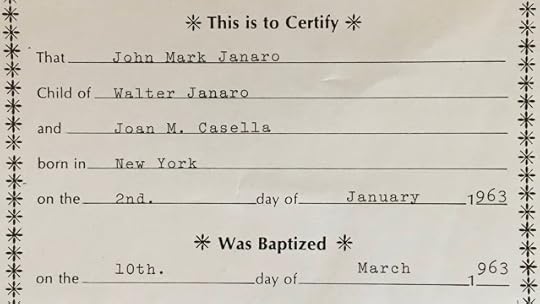
March 8, 2021
Peace Requires Mutual Esteem and Dialogue Between Persons
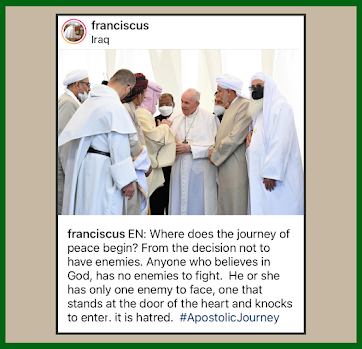 During his visit to Iraq, Pope Francis stressed the importance of fraternal love in establishing peace in a land torn not only by recent foreign misadventures but by religious conflicts inherited from the past. The Pope wasn't saying that religious difference don't matter, but rather that they must not become the pretext for emnity between persons, who are all in the hands of God. The Lord is at work in every person for the fulfillment of His wise and loving plan through Jesus Christ.
During his visit to Iraq, Pope Francis stressed the importance of fraternal love in establishing peace in a land torn not only by recent foreign misadventures but by religious conflicts inherited from the past. The Pope wasn't saying that religious difference don't matter, but rather that they must not become the pretext for emnity between persons, who are all in the hands of God. The Lord is at work in every person for the fulfillment of His wise and loving plan through Jesus Christ. This takes nothing away from the Christian vocation to evangelization, but it excludes all hatred from Christian witness, while also joining with non-Christians in the common recognition that hatred has no legitimate place in any religious life that seeks to do the will of God, or any human life that seeks the good.
We can all acknowledge hatred as the common enemy, which blinds us to the personhood of the other.
March 5, 2021
Pope Francis Begins His Long-Awaited "Pilgrimage" to Iraq
Today Pope Francis embarks upon his first international journey in over a year. He is visiting the much-beleagured and suffering peoples of Iraq, the ancient peoples of Mesopotamia, of the land of Abraham's birth. Today they are mostly Muslims, but they are divided between Sunnis and Shiites living at the edge of the Arab world and on the border with "Persia" (Iran).
The recent wars and their violent civil consequences have driven many of the Chaldean Catholic Christians into exile, but there remains in Iraq a remnant of one of the most ancient Christian communities in the world. They sing their beautiful liturgy in Aramaic, the spoken language of Jesus and the Apostles.
The pastoral solicitude of Pope Francis for Iraq continues (and extends) the concern and attention of his predecessors. I shall never forget the passionate persistence of Saint John Paul II who gave such prophetic witness beginning 30 years ago: how he continually warned the West of the destructiveness and grave dangers of its misguided policies of war and crippling economic sanctions in this region. The modern nation-state of Iraq has always been fragile ever since it was created (artificially) by the European victors of World War I. It has always been difficult (but important) to preserve peace and build fraternity in this precious place, with its imperilled yet tenacious Christian minority, its depth of religious and human culture, and the divisions among its peoples.
Francis knows well his mission here. It is to witness to Jesus's gift of salvation through practical cultivation of conversion of hearts, forgiveness, and the love of one another to which we are all called. Jesus has revealed the mystery of this fraternal love to the world. It is His presence - revealing the Father's love as the true meaning of our lives - that works to draw the hearts of every person beginning from wherever they are on their individual and communal journeys. With intense esteem for everyone and reverence before the mysterious ways of God, the Pope will witness by his very presence that Jesus is the vital heart of our real common humanity - the One who fills history and makes us all brothers and sisters.
As always, the fruits of this courageous gesture are in the Lord's hands.
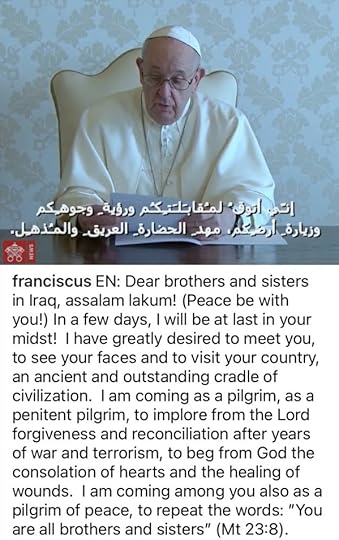
March 4, 2021
The Lord "Probes the Mind and Tests the Heart"
The text posted here (from today's liturgical readings) is really a consolation.
The Lord alone truly sees, probes, tests, draws our hearts. He is our Father who loves us. So much more hopeful than if we were left to ourselves to judge, or worse, left to the judgment of one another!
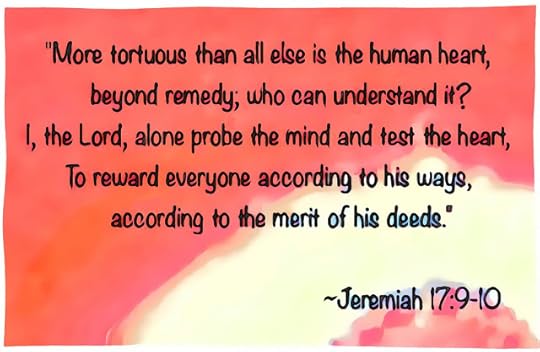
March 3, 2021
The Globe is Golden For Laura Pausini!
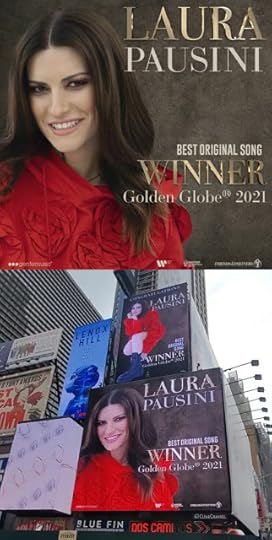 These have been some exciting days for Italy's popular music Prima Donna (and Latin America's "adopted" Mujer Grande), the wonderful Laura Pausini.
These have been some exciting days for Italy's popular music Prima Donna (and Latin America's "adopted" Mujer Grande), the wonderful Laura Pausini.The song "Io Si," which she sang and co-wrote for the movie The Life Ahead (starring the 86-year-old Sofia Loren), won the prestigious Golden Globe award on Sunday night.
Then Laura sang this song on the final day of Italy's San Remo Music Festival, revisiting the place and the event where she first became famous 28 (twenty-eight?!) years ago.
It cannot be possible that I first arrived in Rome 28 years ago, in March of 1993. The buzz about the 18-year-old girl who had just won the Festival was still fresh at that time. The San Remo Festival is a big event in Italy, which has been nationally televised and nationally watched every February-March since the 1950s. Long before Eurovision, or American Idol, or X- Factor, or The Voice, or any of those competitions there was San Remo. In Italy, after all, "popular music" is broadly defined, and singing is even more valued than soccer. Artists have gained national attention there (and occasionally international fame) for a long time. I was still living in Rome in 1994 when a much older (but previously unknown) male singer won and began his own international career. His name was Andrea Bocelli.
Italians are pretty talented people.
Now, after winning at the (mostly virtual but expertly presented) Golden Globe Awards on Sunday, Laura returned (not for the first time) to San Remo to sing to the entire country. Again it was a partly virtual show this year, but it seems that "we-are-getting-good" at doing this new kind of event. It's hard to know what that might mean for the future. But when I compare today to images from 1993, I realize that the world has indeed changed in many ways, even before the pandemic.
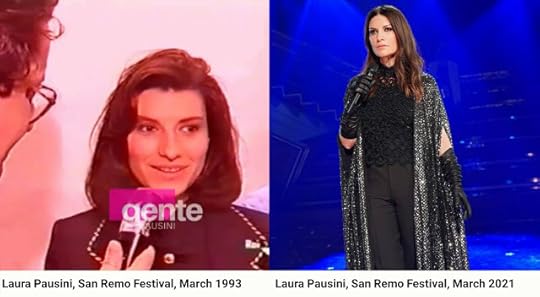
While most '90s pop stars have faded, Laura is bigger (and better) than ever. There are enough Latinos and Latinas in the United States that Laura got a big spot on Times Square on Monday (see picture second from the top). Anglo-America may start, finally, to wake up.
The Oscars are coming soon. I hope she wins again.
March 1, 2021
The Winds of March are Blowing On Us Once Again
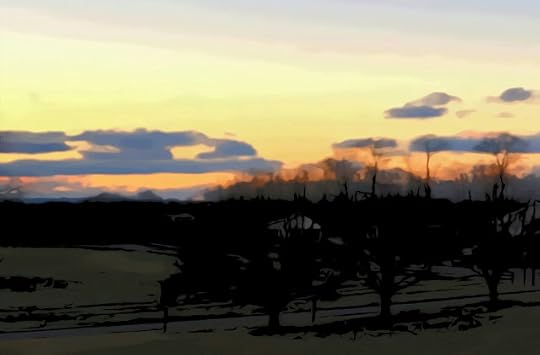 **********************************************************
**********************************************************What will the coming weeks of March in this year of 2021 bring?
Spring, certainly. Much more evening light. Buds and the first blossoms of color. The progress of Lent to the beginning of Holy Week.
In Virginia and most of the United States of America, mid-to-late March will mark one year since the COVID-19 pandemic brought dramatic changes to the structure of our social and economic lives. Though vaccine distribution will continue to increase, we are not likely to see the end the crisis and its far-reaching consequences.
Concrete circumstances vary from one state to another (and in various areas within states). Many adaptations of work, commerce, and social interaction have developed that may well continue in some ways even after the pandemic is finally "over" (though it's hard to see who, if anyone, has the authority to officially declare its end).
We are approaching one year of this strange illness hitting our shores, bringing catastrophe for those gravely afflicted (and their loved ones) as well as requiring heroic and exhausting efforts by overwhelmed medical professionals. All of us have become familiar with "social distancing," cancelled events, "staying-at-home," educational upheaval, magic money from the government, ZOOM, sports in empty stadiums, virtual gatherings of every kind, and many other things we never anticipated 14 months ago when we rang in the new decade on New Year's Day, 2020.
It has been a bizarre and unbearable year for some people, and for all of us it has been (and continues to be) a bit surreal. I don't know what will come next. It's difficult even to come up with plausible imaginary scenarios for vaccinating "everybody" (in the USA? in the world?) rapidly and efficiently, and neatly solving all the problems. Overall, it would be good if we could reach a point where the psychological and emotional stress placed on so many people might be reduced for a significant period of time.
Nevertheless, our lives in this world will never cease to be dramatic, and in some measure arduous. That is the nature of this life: it is a pilgrimage, a journey toward a fulfillment that we never experience definitively in this world. In various ways, we learn through the circumstances of our lives how to travel the road and arrive at its destination, if we permit our minds and hearts to be thus educated.
March has been a month of difficult changes in my life for the past 3 years.
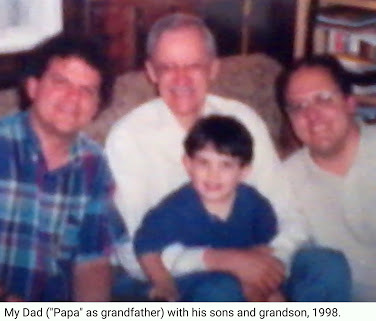 In March 2018 my father collapsed, literally, and the whole dynamic of our family changed. A man who had taken care of himself for more than 80 years suddenly needed a network of medical assistance and physical and psychological care. This blog includes the memories of the year that followed, which was so hard and yet called his children and grandchildren to learn to love in new ways (while - I trust - mysteriously preparing him for the final length of his own journey).
In March 2018 my father collapsed, literally, and the whole dynamic of our family changed. A man who had taken care of himself for more than 80 years suddenly needed a network of medical assistance and physical and psychological care. This blog includes the memories of the year that followed, which was so hard and yet called his children and grandchildren to learn to love in new ways (while - I trust - mysteriously preparing him for the final length of his own journey).In March 2019, I had just begun to think that we had "settled in" to new routines with Dad, who seemed more stable and comfortable (as much as could be hoped under the circumstances). Then over a few weeks he got pneumonia and succumbed to systemic complications. He died peacefully on April 3, 2019. We accompanied him through the final weeks and days in a way that brought us all closer together but also brought grief in its aftermath, with all its features that appear to be as unique as the person whose loss we grieve.
At the beginning of March 2020 - even as I heard of mounting complications from the growing coronavirus epidemic in Europe - I expected that for me the month would be marked primarily by the ongoing grieving process, which would include the inevitable "emotional revisiting" of the events of the prior year. The last thing I expected was that by the end of the month, the State of Virginia, the rest of my country, and most of the world would enter into one degree on another of lockdown - that daily life for millions of people would be constrained in ways no one could have imagined while the medical and scientific community tried to understand and battle against a highly contagious, weirdly capricious, and sometimes fatal disease that was spreading everywhere. The fact that most cases were apparently mild was reassuring in one way but unnerving in another: no one could be sure whether or not they had the disease and could become a source of infection to others (some of whom might become seriously ill).
The USA's testing program was woefully unprepared at first, then insufficiently accessible for too long, and sometimes kafkaesque in its procedures. But eventually, widespread testing did become available. A year later, many of us have had (or at least know people close to us who have had) a positive COVID-19 test and/or an uncomfortable but not unbearable case of the infection. We are also all-too-aware of people for whom the disease has been a terrible tragedy, and others for whom the accompanying social and economic upheaval have presented grave challenges for their work, livelihood, or education.
I'm not going to try to forecast what the end of March 2021 will be like. Of course, I have subconscious expectations and not-always-sub-conscious anxieties. As the winds of March blow, I feel in them my own humanity: with so much to be grateful for, and with still more aspirations and an inexhaustible desire. I feel my humanity: vulnerable, inadequate, flawed, full of needs that I cannot meet by my own strength, and wanting to remember every day - again and again - that God is my strength and that my trust must be in Him even as I contribute my own best efforts together with others to face whatever challenges lie ahead.
